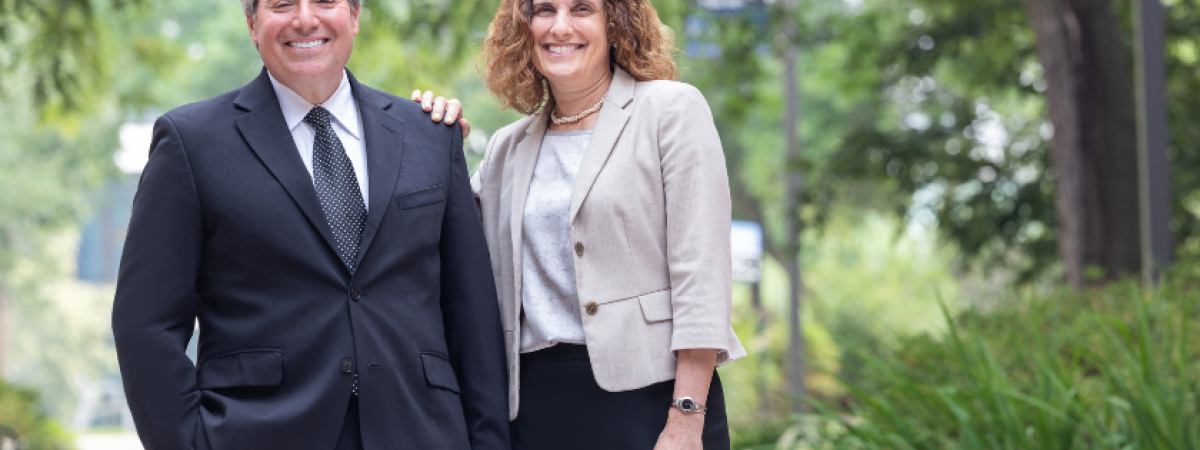This article originally appeared in the fall issue of In Brief, the Law School’s alumni magazine. As November 14 is the ten year anniversary of their joint appointment, we are republishing it here.
Deans Jessica Berg and Michael Scharf have made impressive impacts on the School of Law—and set a strong example for collaborative leadership
Sometimes Dean Michael Scharf brings a prop to meetings—a cowbell made famous by a Saturday Night Live skit in which a music producer repeatedly calls for a song to have “more cowbell.”
“The cowbell helps make a point when we’re being too cautious,” said Scharf. “Leaders can’t afford to do that—we have to experiment and move forward.”
Fellow dean Jessica Berg is known for providing balance, approaching decisions methodically after careful consideration.
“And I can tell you,” Scharf said, laughing, “a lot of times that’s saved our bacon.”
“We may have different styles, but we have a lot in common,” Berg said. “We’re both very energetic and highly collaborative.”
Consensus-building and open communication—with each other and the law school’s constituents—have been hallmarks of their decade of deanship.
And it’s clearly working.
Under their leadership, the law school has expanded degree programs, grown enrollment and set school records for fundraising, among other accomplishments.
What’s more, their co-deanship is the longest-ever at any U.S. law school—and among the longest at any U.S. university.
“They’re the poster team. When anyone talks about whether co-deans can work, everybody always points to Michael and Jessica as the example to show it can be done,” said Andrew Strauss, dean of the University of Dayton School of Law.
“It's a tough thing to pull off,” he added, “but they have real chemistry.”
Motion carried
The deanship did not begin with visions of a long-term partnership. Berg and Scharf assumed the roles unexpectedly in the middle of a semester, stepping in during a difficult time at the law school.
“We walked in from day one saying we were not interested in being in a holding pattern,” said Berg.
Facing sharp declines in enrollment and revenue, the then-acting (and later, interim) deans created a plan to stabilize finances, restore trust in the school’s leadership, and address other immediate and long-term needs.
“They didn't suggest they had a magic formula to solve every problem,” said Jonathan Entin, professor emeritus of law who was on the faculty for 40 years. “But they understood this place and moved us forward together.”
Direct appeal
Since being named full deans in 2015, Berg and Scharf have leaned into the advantage of having two people tackle the workload.
A division of labor “allows us to literally be in two places at once,” said Berg.
Each dean is responsible for particular facets of the job. Berg handles finances, facilities and human resources; Scharf leads marketing, communications, international programs and chairs faculty meetings.
With strategic thinking and planning, Berg and Scharf discuss, deliberate and make decisions together.
They tag-team on events, including fundraising, attending together or taking turns.
“I never feel as if we have half a dean at our meetings,” said Nicole Braden Lewis (LAW ‘01), president of the Law Alumni Association Board, which hosts Berg and Scharf frequently. “Whoever is with us speaks on behalf of them both. Frankly, it’s given us more time with leadership.”
Duty-splitting means at least one dean is almost always in Cleveland, which has created the presence of stability at the law school, said Sharona Hoffman, the Edgar A. Hahn Professor of Law.
“The continuity they’ve brought has been a huge advantage,” said Hoffman, who has been on the faculty for 24 years. “It’s allowed faculty to place more focus on our work.”
New standard
During the deanship, the law school’s faculty have been recognized with new distinctions in teaching, research and advocacy. The deans are credited with shoring up many of the school’s specialty areas, solidifying experiential education as a standout strength by opening new law clinics, and introducing unique degree programs that draw on international partnerships.
“They’ve been distinctly successful in being creative and entrepreneurial,” said Robert B. Ahdieh, dean of the Texas A&M University School of Law. “They have a reputation as deans who are not afraid to try new things, and our fellow deans hold them highly in that regard.”
Berg and Scharf also make regular efforts to build morale, emphasizing community-building and organizing social events—including regular get-togethers at which Scharf’s faculty-student band, Razing the Bar, plays classic rock for students, faculty and staff (see p. XX).
“We both enjoy our jobs,” said Berg. “And we want other people to enjoy their work, too.”
Added Scharf, “Having fun is one way to build a community, and that’s important to us.”
Gabe Kaufman (LAW ‘23) can testify to it. As an 8-year-old, he had Scharf as a youth hockey coach. When Kaufman enrolled as a law student years later, he immediately recognized the dean’s infectious enthusiasm.
“Scharf is a great cheerleader for the school—a permanently jovial man,” said Kaufman, who served as Student Bar Association president and met often with the deans to discuss student concerns and suggestions.
“Both deans are great listeners,” said Kaufman, an associate at Thompson Hine. “They understand there are 500 stress-filled future lawyers in the building, so they go out of their way to create a positive learning environment that also prepares us to practice.”
Even with all the responsibilities of the position, both Scharf and Berg continue to teach regularly to stay connected with students.
“It conveys an important message,” said Entin. “Yes, they’re deans, but they’re not at such a lofty place. They’re right in front of students—and that matters.”
Sustained
In recent years, many areas of the law school have received significant makeovers, thanks to alumni gifts. The renovations have made the building’s interior both familiar and revived—apt symbolism for the deans’ effect on the institution.
Looking ahead, Berg and Scharf speak of capitalizing on gains, including establishing a “game-changing” scholarship fund to provide opportunity for future students—just one of an ambitious array of goals.
In other words—more compromise, collaboration … and cowbell.
“Jessica and I had confidence that the Co-Deanship would work,” said Scharf. “But we also couldn’t have anticipated it working out so well.”
After ten extraordinarily successful years, the co-deans have chosen to step down from their leadership roles this coming summer. The university plans to launch a national search for the school’s next dean.
“Michael and Jessica have been exceptional advocates for the law school,” Case Western Reserve University President Eric W. Kaler said. “They have strengthened academic offerings, broadened experiential learning opportunities and increased financial support for students. We appreciate their dedication, and thank them for their leadership.”





